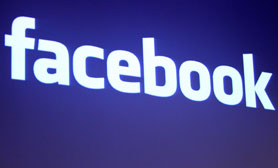Facebook hits $50bn value mark after bank investment
As the social networking site Facebook reportedly lands a cash injection which values the company at $50bn, Channel 4 News commentators debate the success and investment of the social media giant.
It has friends in high places: the social networking site Facebook has reportedly landed a cash injection from the investment bank Goldman Sachs and a Russian firm in a deal that puts the company’s value at 50 billion US dollars – £32bn.
More than half a billion people around the world are now on Facebook – so what will this new deal mean and why would a Wall Street bank be interested?
Jon Snow ponders the value of Facebook
For Channel 4 News presenter Jon Snow Facebook will always be inferior to a certain microblogging site.
“I’ve just made a rare sortie to my Facebook page to be greeted by someone’s feet. I’m afraid that may be why I don’t often bother to go to Facebook.
“The feet are perfectly enticing, but as I set about my day, do I need them right now? Do I need to know that assorted people have written on my “wall”? Do I get excited that seven people have “poked” me in the last week and that three people have asked me to “be their friend” today?

“Facebook is full of time-consuming diversions. Potentially hugely attractive and amusing, I have no doubt…but then I have no time for either.
“Twitter, on the other hand, is focused, fast, informing, and the future. I am told in the newsroom that part of the $50bn that Facebook is now worth is ME! I am told that I have a monetary value – I am so excited by this concept that I have practically fallen off my chair as I write this.”
Read more and have your say on Jon Snow’s analysis of Facebook on Snowblog.
Faisal Islam: The Facebook bubble is down to QE2
For Economics Editor Faisal Islam the Facebook investment is a result of quantitative easing.
“Ben Bernanke is not on Facebook. Today his status update would read: “Look! QE2 is working.”
“It is certainly worth the US Federal Reserve boss giving Mark Zuckerberg a poke.
“For me this is the only way to explain a truly extraordinary deal that values a company with an unproven business model at $50bn.
“I was taken back to 1999, when as a cub internet reporter, I was invited to the Barcelona conference of the legendary CSFB technology team. There I was patiently informed that a company’s valuation did not depend on or even require profits or even revenues.
“‘This is a landgrab’, I was told, and companies could be valued on a per-click basis, or even projected per-click basis. Now clearly this was bubble time nonsense, though the essence of some of what was said in the lead-up to the dotcom bubble was true. There was a land grab on. Some of those companies were to change the world and make an awful lot of money. But most did not. And the valuation metrics were absurd.
“And so what about $50bn Facebook? Is each of the 500 million active users really worth $100 for the invaluable information contained within inane warblings and pointless status updates? If that is the case than I would guess that each of the Tesco Clubcard members or Amazon customers are worth much much more, and guess what, they actually are all paying customers.”
Read more on Faisal Islam’s analysis of Facebook and have your say on the Economics blog.
Benjamin Cohen: $50bn? Facebook is worth a lot more
Technology Correspondent Benjamin Cohen says that the social networking giant has redefined interaction and deserves to be worth a lot more.
“Today there’s been a bit of a divide going on at Channel 4 News towers. Some of the team think that Facebook is the best thing since sliced bread, while the others think that it’s a flash in the pan and over-valued at $50bn. I’m advocating the former. I think the company has redefined the way that millions of people interact with their own social network and will in time re-define the internet.
“Facebook wasn’t the first social network, not by a long way. But it was the first one that actually, really truly worked. Facebook is the first that understood the way that we interact with each other in real life.
“Ten years ago, I sold my own social networking type website, soJewish. It kind of did what you’d expect from the name, connect Jewish people from around the world. It had chat, dating and message boards. It had a lot of the rudimentary features that we’re now so familiar with Facebook. It kind of worked, someone got married from meeting there, it made money from advertising and it merged with a newspaper.
“But it only kind-of worked. The problem was that it was connecting you with people you didn’t know. It didn’t occur to me that it should have been about reinforcing the communications you already had with your friends. “That’s what telephones are for,” I probably would have said if I could travel back in time to convince my younger self to change the business.
“And what I didn’t get and I think my colleagues Faisal Islam and Jon Snow (who have blogged a contrary view) don’t get, is that Facebook in a sense is rather like a telephone. It is the communication system of the 21st century and owning a piece of Facebook is a little like owning the patent to the telephone.”
For more analysis from Benjamin Cohen on Facebook and to have your say visit the Technology blog.